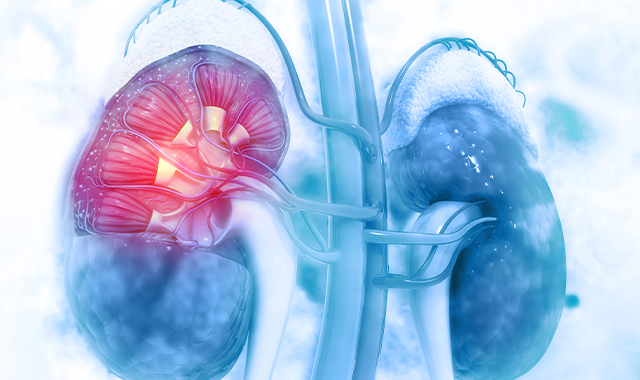Belzutifan/Cabozantinib Elicits Promising Activity in Clear Cell RCC
Safety data from the phase 2 LITESPARK-003 trial evaluating belzutifan/cabozantinib in renal cell carcinoma show no treatment-related deaths.
Safety data from the phase 2 LITESPARK-003 trial evaluating belzutifan/cabozantinib in renal cell carcinoma show no treatment-related deaths.

Belzutifan (Welireg), an HIF-2α inhibitor, in combination with cabozantinib (Cabometyx) elicited favorable antitumor activity in previously untreated patients with advanced clear-cell renal cell carcinoma (RCC), according to results from a single cohort of the open-label, single-arm phase 2 LITESPARK-003 trial (NCT036345540) published in The Lancet Oncology.
Of 50 patients evaluable for efficacy, 35 (70%; 95% CI, 55%-82%) achieved a confirmed objective response, with 4 patients (8%) attaining a complete response (CR) and 31 patients (62%) attaining a partial response. Additionally, among patients classified as having poor or intermediate International Metastatic Renal Cell Carcinoma Database Consortium (IMDC) risk (n = 22), 13 (59%; 95% CI, 36%-79%) patients had a confirmed objective response, with 1 (5%) achieving a CR and 12 (55%) achieving a PR.
Furthermore, the median progression-free survival (PFS) within this cohort was 30.3 months (95% CI, 16.6-not reached [NR]), and the median overall survival (OS) rate was not reached (NR; 95% CI, NR-NR). The estimated 12- and 24-month PFS rates were 69% (95% CI, 52.1%-81.0%) and 57% (95% CI, 38.5%-72.0%), respectively, and the 12- and 24-month OS rates were 96% (95% CI, 84.2%-98.9%) and 86% (95% CI, 68.2%-94.0%).
“[B]elzutifan plus cabozantinib has promising antitumor activity in treatment-naive patients with clear-cell [RCC],” Toni K. Choueiri, MD, Jerome and Nancy Kohlberg chair and professor of Medicine at Harvard Medical School and director of the Lank Center for Genitourinary Oncology at the Dana-Farber Cancer Institute, wrote in the publication with study coinvestigators. “Results from this study support further investigation of this regimen, including biomarker analysis to select patients in whom belzutifan plus cabozantinib might be most effective.”
The ongoing 2-cohort phase 2 LITESPARK-003 trial enrolled 138 patients with locally advanced or metastatic clear cell RCC. In total, 50 treatment naïve patients were included in the final efficacy analysis, as 36 were excluded in the study and 52 were included in a cohort for pre-treated patients, the data from which were previously reported in a separate publication because findings for the treatment-naïve cohort were unavailable at the time.
The median patient age was 64 years (IQR, 57-72), with 23 (46%) patients being 65 years or older. This population was predominately male (80%), White (96%), and had an ECOG performance status of 0 (66%). Patients had either favorable (56%), intermediate (40%), or poor (4%) IMDC risk, and 40 patients (80%) had previous nephrectomy.
Patients in this cohort self-administered 120 mg of belzutifan and 60 mg of cabozantinib both orally once daily until unacceptable toxicity, progressive disease, or withdrawal. Belzutifan could be reduced to 80 mg once daily or further to 40 mg once daily to manage adverse effects (AEs) at the investigator’s discretion.Similarly, cabozantinib could be reduced to 40 mg or 20 mg once daily to manage AEs, with treatment interruption with either agent permitted for up to 3 weeks in the event of toxicity.
The primary end point of the study was the proportion of patients with a confirmed objective response, defined as best overall response of CR or PR per RECIST v1.1 criteria by investigator assessment. Secondary end points included time to response, duration of response, PFS, OS, and safety.
All patients had at least 1 any-grade AE, with 30 (60%) experiencing at least 1 grade 3 or higher AE. Additionally, 14% of patients experienced serious treatment-related AEs. AEs leading to belzutifan dose reductions and interruptions occurred in 28% and 48% of patients, respectively. At the time of data cutoff, 5 (10%) patients had died.
The most common grade 1/2 AEs included anemia (76%), diarrhea (74%), fatigue (58%), alanine aminotransferase increase (52%), and nausea (52%). The most common grade 3 or 4 AEs were hypertension (12%), anemia (10%), fatigue (8%), hypoxia (6%), and palmar-plantar erythrodysesthesia syndrome (6%).
Reference
Choueiri TK, Merchan JR, Figlin R, et al. Belzutifan plus cabozantinib as first-line treatment for patients with advanced clear-cell renal cell carcinoma (LITESPARK-003): an open-label, single-arm, phase 2 study. Lancet Oncol. 2025;26(1):64-73. doi:10.1016/S1470-2045(24)00649-1